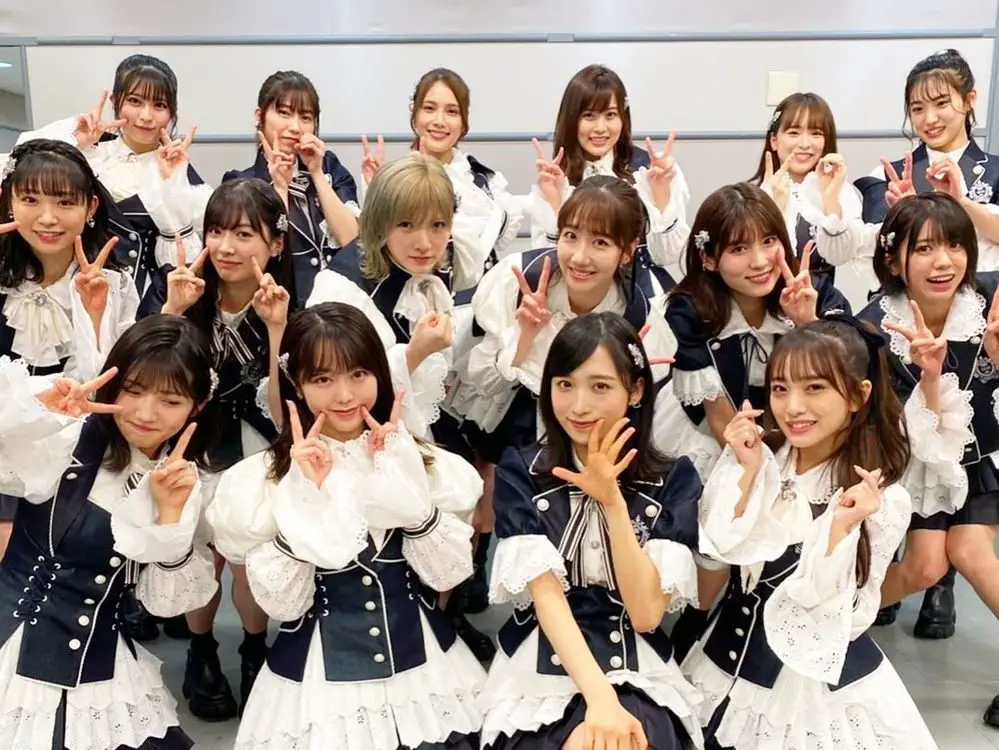It’s a crowd, both on and off the stage.
AKB48, founded in 2005, is Japan’s most popular idol group, with an astounding 92 current members and hundreds more in their sister groups scattered across Asia. Named for their place of origin (Akihabara) and their original number of members (48), AKB48 may seem odd and overwhelming for those used to girl groups and pop bands in the single digits. But AKB48 isn’t your ordinary musical sensation — they’re idols, but they’re also the girl next door, the girl on the subway, the girl working at the register and the girl teaching a class two streets over.
https://www.instagram.com/p/CQEC5l7rQ5q/
Unlike with K-pop groups, the members of AKB48 “debut” without undergoing the years of training and vocal practice that’s standard practice in the Korean industry. Many of the members in the group are still learning how to perform, and fans can follow the progress of the “trainee” members to “graduates” as well as meet them for themselves at the band’s various “handshake” events. The founder, Yasushi Akimoto, wanted a group that you could relate to and support throughout their journeys as performers. In an interview with The Wall Street Journal in 2011, Akimoto explained that “AKB48 girls are ‘unfinished.’ In other words, they’re still not very good at singing or dancing.”
One fan, Norio Uchida, explained AKB48’s appeal in an interview with CNN: “Unlike the usual idols who are always cute and great, the gap, or offbeatness is attractive to me … They are very ordinary. That’s great.”
AKB48 was formed with fans in mind, and their performances are the same. Rather than touring or performing on music shows (though they also do this), the band has their very own theater in Akihabara, with daily shows. With a capacity of only 250 people per show, fans are required to enter a ticket lottery months in advance in order to purchase tickets. Their concept as a group is based on the idea of “idols that you can meet,” every day and any day on the 8th floor of the Don Quijote store in Akihabara.
The considerable number of idols in AKB48 is partly so that the daily performances are possible — members rotate in order to allow non-performing members to get some rest or conduct photo shoots, interviews, tours or other activities in the music industry. Note that most fans, except for those who are truly dedicated, do not memorize all 92 faces, names and information about AKB48’s members. Most people focus on the Center, the Ace and their oshimen or “bias” of each team.
It’s a hit — ever since their founding 15 years ago, AKB48 is J-pop’s top group, with over 62 million CDs sold in total and the ability to churn out “million” songs (those that sell over 1 million pre-sale copies) seemingly every year. They are economic powerhouses, selling everything from bubble gum to computers, and they even represent Japan in political shows and military recruitment schemes. AKB48 has its own manga series, video games and various sister groups and theaters scattered throughout Japan and Asia.
AKB48’s business model has been replicated through shows like “Produce 101” (Korea) and “Idol Producer” (China), where a hundred hopefuls compete for a dozen or so spots in the resulting girl or boy group. “Produce 48,” a collaboration between AKB48 and “Produce 101,” resulted in the girl group Iz*One, which was an immediate success in Korea and Japan and charted on Billboard World Albums with their debut single, “La Vie en Rose.”
But undoubtedly the biggest reason for their financial success is that bundled with each copy of their latest single or album is a ballot to vote in AKB48’s annual “general election.” Accrued votes are used to determine the popularity rankings, which in turn informs a member’s prominence in future songs and videos. There’s no limit to how many votes you can buy, and fans will buy dozens to hundreds of copies (each priced at around $30) just to support their favorite member.
It’s not just AKB48 that rakes in the cash in this way — for years, idol groups in both Japan and Korea have been bundling election ballots, meet-and-greets, concert tickets and other potential prizes with their albums. Thanks to that, the idol industry continues to rake in tons of revenue from physical media sales, despite its predominately young and digital-savvy fandom.
Although AKB48 has dominated Japan and other Asian countries with their sister groups such as Shanghai’s SNH48, Jakarta’s JKT48 and Manila’s MNL48, they aren’t truly global in the sense of the music industry. They have yet to break into the biggest music market — the United States. AKB48 routinely floats to the No. 1 position on Billboard Japan, but the closest they’ve come to its American counterpart is on Billboard’s “Next Big Sound,” where they peaked at No. 7 earlier this month on June 12.
Granted, foreign music is hard to sell — language barriers, cultural differences and bizarre production choices are just some of the reasons for this. But the rise of K-pop in Western media shows that people are receptive to songs sung in other languages and images of other cultures. AKB48 should be no different then. So why haven’t they penetrated the Western consciousness as much as K-pop groups have? Since AKB48 has been around for over 15 years, they have both the means and ability to go abroad and have been domestic superstars almost since their debut.
AKB48 shares commonalities with K-pop in that the art and the girls behind it are heavily commodified and their success depends on a strong, devoted fanbase, but that’s where the similarities end. Despite ticking all the boxes for global success, AKB48 is tailored to a specific subculture unique to Japan: otaku culture. Otakus are those who are obsessed with popular culture, from anime to video games to web novels, to the detriment of everything else. AKB48’s success has depended heavily on the obsessive nature of their otaku fans, usually young men and women.
Put bluntly, they are the perfect customer base for a group such as AKB48 because they are guaranteed to buy albums, and buy they have. AKB48’s music seems like little more than an afterthought; fans regularly dump hundreds of albums after their purchase, many of which were only bought for each album’s ballot vote in AKB48’s president election (read: popularity contest). Their music is cookie-cutter, largely uniform, and heavily produced which, granted, is still catchy and by nature necessary for these “unfinished” idols.
AKB48 has fully capitalized on the otaku subset of Japanese consumers to develop their domestic success, but it’s clearly not enough to establish a significant international following akin to that of BTS or Blackpink. Most foreigners still see AKB48 as a unique Japanese product and a cultural oddity to gawk at, something not to be missed as part of the “Japanese experience” rather than musical artists in their own right.
In order for AKB48 to grow outside of their own self-imposed barriers, perhaps it’s time to rebrand. AKB48 needs to be known as something greater than just idol music, where the focus is not on the music but on the merchandise, which basically includes the idols themselves. The customer demand is inelastic, relegated to the dedicated otakus and superfans who will buy multiple albums, leading to stagnant growth. With AKB48 as it is right now, success depends on promotion, not the music.
Perhaps a new unit is in order, one with “graduated” members — and thus actually trained and experienced idols — that produce music in a range of genres. Increase collaboration with other Japanese or international musicians, especially Western ones if they’re looking to break into the U.S. market. Diversify their fanbase, so that many come and stay not just for the idols themselves, but for the music too.

















